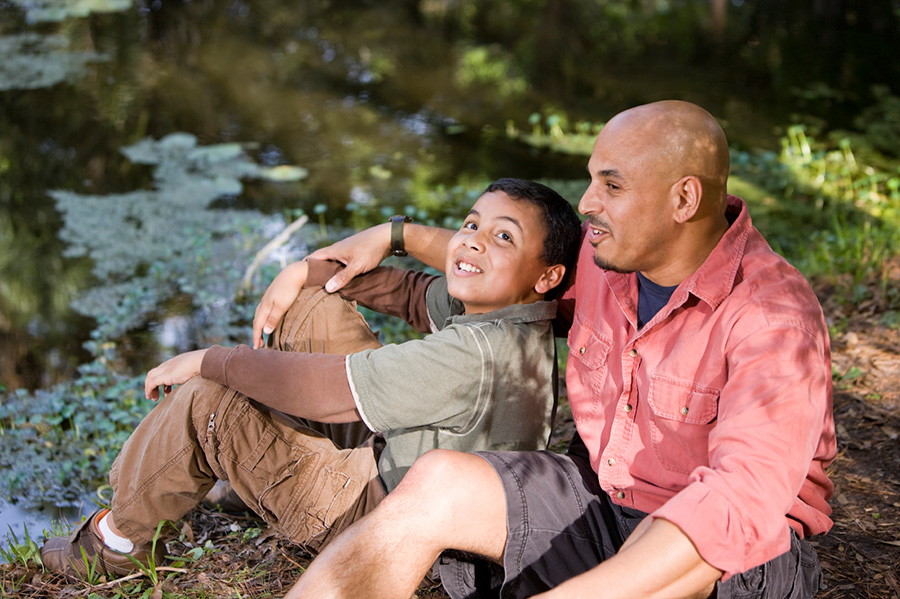The tween years are hard, there’s no doubt about it. Between changes in their bodies, peer pressure, and higher expectations, children in the upper elementary and junior high years are going through a lot. When you factor in the onslaught of hormones, things get even more complicated!
All parents of tweens know that the road to adulthood will have a few bumps and twists, but it can be unnerving to be faced with the sudden mood swings of your growing adolescent. How do you know when the dramatic outbursts or shifts from happiness to despair are a normal part of growing up, or something more serious?
With the prevalence of childhood depression increasing dramatically, that is a very real question. Recent statistics have shown that depression in the tween age group can be as common as 1 in 30 kids! That means in a typical public school classroom, chances are good that one of the children will be struggling with a form of major depression.
So how do you know when your tween’s mood swings require more professional help? Here we will discuss some of the warning signs of childhood depression, and what you can do to support your tween through their process.
Signs of Tween Depression
The signs of depression in tweens are often easily mistaken for “typical” adolescent angst. When diagnosing clinical depression in children, experts look at four key areas of concern – academics, social life, family, and internal self-talk. If your child’s symptoms are having a dramatic effect on all of these areas of their life and have lasted longer than two weeks, it is imperative that to reach out to a professional for further help.
Other warning signs of depression in tweens include:
- Extreme sadness, anger, fear, or anxiety
- Loss of interest in activities they enjoy
- Isolating themselves from friends and family
- Changes in sleep (either insomnia or sleeping too much)
- Unexplained change in appetite or weight
- Poor grades in school
- Lethargic or feeling lazy and unmotivated
- Thoughts of self-harm or suicide
- Unexplained headaches, stomach pain, or body aches
- Obsession over body image
If your tween is having suicidal thoughts or threatens self-harm – do not hesitate to reach out for help, even if you are unsure how serious they are! Call 911 or your local mental health crisis hotline to get your child the immediate help that they need.
Causes of Childhood Depression
The causes of childhood depression and dramatic rise in its occurrence are not fully understood, and we do know that they depend on a number of different factors, including situational changes or genetics. Childhood depression can appear in several forms, including:
Characterized by severe depression that has long-term effects
Long-term depression that is less severe than major depression
- Adjustment disorder with depressed mood
This situational form of depression can be triggered by major changes or events
Although depression can manifest in different ways, what is actually going on within your tween’s body to cause it? Researchers are still trying to fully answer this question, but most non-situational depression can be linked to an imbalance of neurotransmitters within your child’s brain. In cases such as this, medication can be helpful in restoring this balance and regulating mood.
When depression hits out of nowhere after your tween has gone through a major life change, they are likely dealing with the emotional fallout of not being able to sort through their complicated feelings. Events like divorce, moving, or the loss of a friend or family member are common triggers for depression in children. In this case, emotional support from family and counselors can be very helpful for your child.
Treatment Options Available
So what do you do when your tween is showing signs of serious depression? The first step is to reach out to a pediatric mental health center or contact their pediatrician for a referral. Proper diagnosis of the type of depression affecting your tween is essential to getting the type of care that will most benefit them.
Through the process, remind your child that they have nothing to be ashamed of, and that you will always support them. To a tween struggling with depression or anxiety, being consistently reminded that they have your unconditional support goes a long way.
There are three general directions of treatment for childhood depression – medications, mental health counseling, and a combination of the two. What is right for your tween and your family is a decision that should be made with the input of a counselor and/or pediatrician.
Looking to the Future
It can be scary for the parent (and the child!) to be faced with the reality of dealing with childhood depression. Fortunately, the odds are in your tweens favor. Research shows that around 90% of children diagnosed with depression make significant recoveries within a year of starting treatment.
While that is great news for your tween, it is important to remain vigilant and keep the conversation open as they continue to grow and develop. Children with clinical depression are at a high risk of reoccurrence. In fact, if depression was diagnosed in the tween years (before age 14), there is a one in three chance that it will return within a year of making their recovery. Long term, there is a 75% chance that your tween will relapse into depression within four years.
Don’t let these numbers defeat you, however! There are many outside factors associated with childhood depression, and it is not a life-long sentence. By continuing to support and guide your tween in recognizing the signs of depression and how to reach out for help, you can guide them down the path of a healthy, happy, and stable emotional life.
